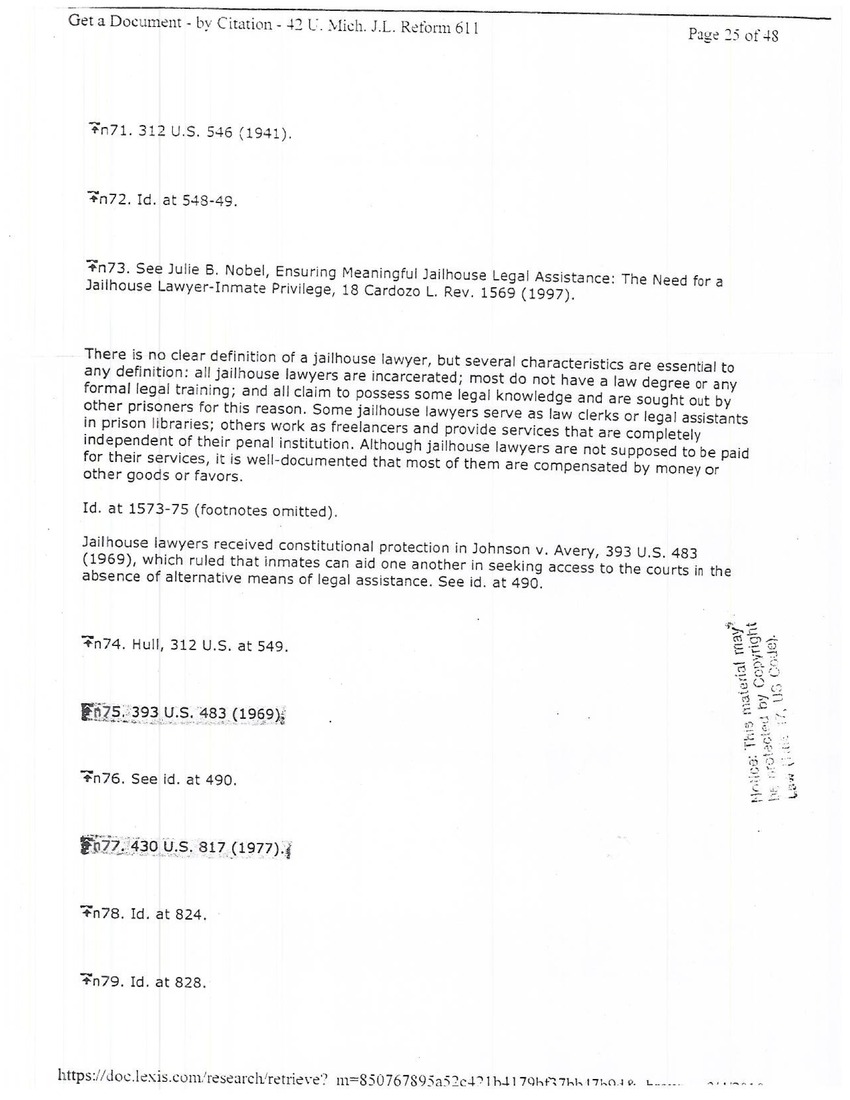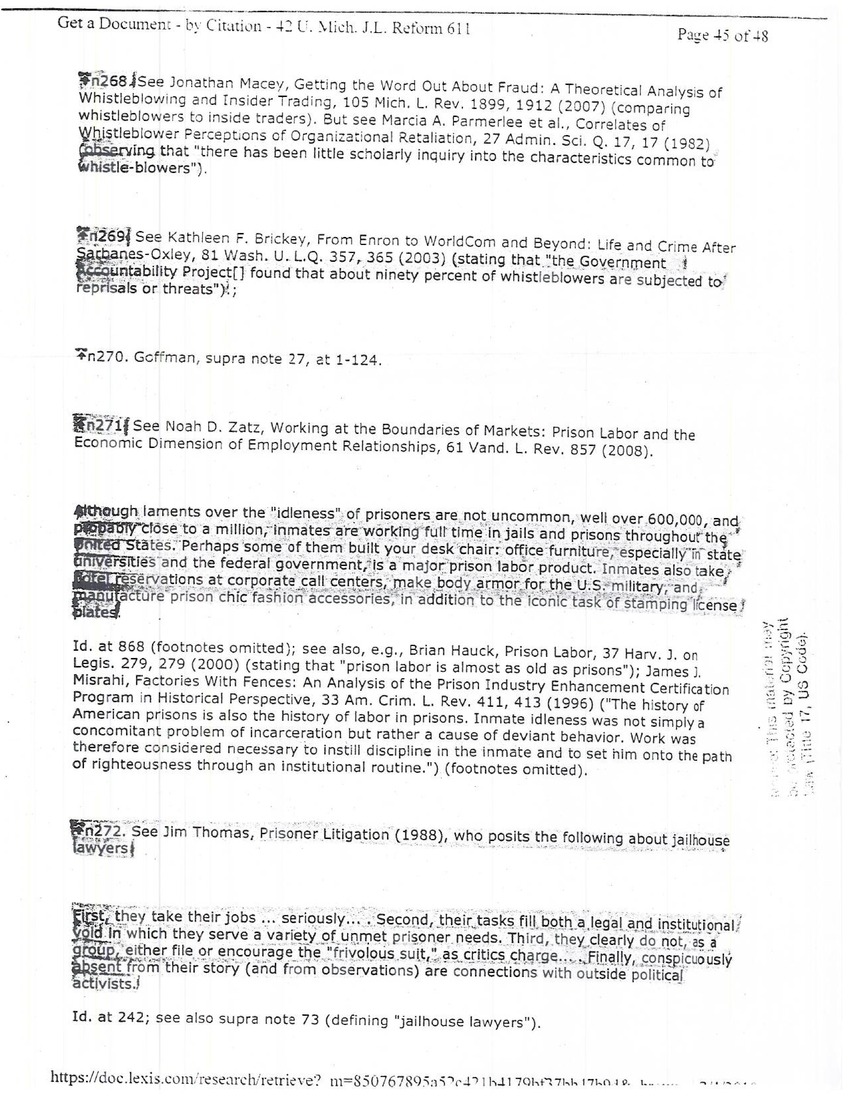
Transcription
Get a Document - by Citation - 42 U. Mich. J.L. Reform 611 Page 25 of 48
^n71. 312 U.S. 546 (1941).
^n72. Id. at 548-49.
^n73. See Julie B. Nobel, Ensuring Meaningful Jailhouse Legal Assistance: The Need for a Jailhouse Lawyer-Inmate Privilege, 18 Cardozo L. Rev. 1569 (1997).
There is no clear definition of a jailhouse lawyer, but several characteristics are essential to any definition: all jailhouse lawyers are incarcerated; most do not have a law degree or any former legal training; and all claim to possess some legal knowledge and are sought out by other prisoners for this reason. Some jailhouse lawyers serve as law clerks or legal assistants in prison libraries; others work as freelancers and provide services that are completely independent of their penal institution. Although jailhouse lawyers are not supposed to be paid for their services, it is well-documented that most of them are compensated by money or other goods or favors.
Id. at 1573-75 (footnotes omitted).
Jailhouse lawyers received constitutional protection in Johnson v. Avery, 393 U.S. 483 (1969), which ruled that inmates can aid one another in seeking access to the courts in the absence of alternative means of legal assistance. See id. at 490.
Notice: This material may be protected by Copyright Law ([difficult to read] 17, US Code).
^n74. Hull, 312 U.S. at 549.
^n75. 393 U.S. 483 (1969).
^n76. See id. at 490.
^n77. 430 U.S. 817 (1977).
^n78. Id. at 824.
^n79. Id. at 828.
https://doc.lexis.com/research/retrieve? m=950767895a52c421b[difficult to read]
Get a Document - by Citation - 42 U. Mich. J.L. Reform 611 Page 45 of 48
^n268 See Jonathan Macey, Getting the Word Out About Fraud: A Theoretical Analysis of Whistleblowing and Insider Trading, 105 Mich. L. Rev. 1899, 1912 (2007) (comparing whistleblowers to inside traders). But see Marcia A. Parmerlee et al., Correlates of Whistleblower Perceptions of Organizational Retaliation, 27 Admin. Sci. Q. 17, 17 (1982) (observing that "there has been little scholarly inquiry into the characteristics common to whistle-blowers").
^n269 See Kathleen F. Brickey, From Enron to WorldCom and Beyond: Life and Crime After Sarbanes-Oxley, 81 Wash. U.L.Q. 357, 365 (2003) (stating that "the Government Accountability Project[] found that about ninety percent of whistleblowers are subjected to reprisals or threats"):;
^n270. Goffman, supra note 27, at 1-124.
^n71. See Noah D. Zatz, Working at the Boundaries of Markets: Prison Labor and the Economic Dimension of Employment Relationships, 61 Vand. L. Rev. 857 (2008).
Although laments over the "idleness" of prisoners are not uncommon, well over 600,000, and probably close to a million, inmates are working full time in jails and prisons throughout the United States. Perhaps some of them built your desk chair: office furniture, especially in state universities and the federal government, is a major prison labor product. Inmates also take hotel reservations at corporate call centers, make body armor for the U.S. military, and manufacture prison chic fashion accessories, in addition to the iconic task of stamping license plates.
Id. at 868 (footnotes omitted); see also, e.g., Brian Hauck, Prison Labor, 37 Harv. J. on Legis. 279, 279 (2000) (stating that "prison labor is almost as old as prisons"); James J. Misrahi, Factories With Fences: An Analysis of the Prison Industry Enhancement Certification Program in Historical Perspective, 33 Am. Crim. L. Rev. 411, 413 (1996) ("The history of American prisons is also the history of labor in prisons. Inmate idleness was not simply a concomitant problem of incarceration but rather a cause of deviant behavior. Work was therefore considered necessary to instill discipline in the inmate and to set him onto the path of righteousness through an institutional routine.") (footnotes omitted).
Notice: This material may be protected by Copyright Law ([difficult to read] 17, US Code).
^n272. See Jim Thomas, Prisoner Litigation (1988), who posits the following about jailhouse lawyers.
First, they take their jobs... seriously... Second, their tasks fill both a legal and institutional void in which they serve a variety of unmet prisoner needs. Third, they clearly do not, as a group, either file or encourage the "frivolous suit," as critics charge... Finally, conspicuously absent from their story (and from observations) are connections with outside political activists.
Id. at 242; see also supra note 73 (defining "jailhouse lawyers").
https://doc.lexis.com/research/retrieve? m=950767895a52c421b[difficult to read]
Other posts by this author
|
2023 feb 1

|
2022 dec 14

|
2022 dec 12

|
2022 dec 10

|
2022 aug 31

|
2022 jun 22

|
More... |



Replies